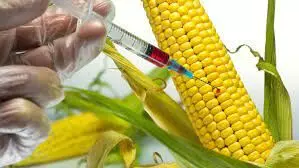- Home
- /
- More
- /
- Agriculture
- /
- GMO crops not national...
GMO crops not national security, biotech terrorism threats — BSN

Prof. Sylvia Uzochukwu, the National President, Biotechnology Society of Nigeria (BSN), says Genetically Modified Organism (GMO) crops do not pose national security threat and cannot be used as weapons of biotech terrorism.
Uzochukwu made this clarification in response to a letter written to the National Assembly, through the Senate President, Godswill Akpabio, in Abuja.
Supreme News reports that one Dr Philip Njemanze had in a recent letter to the National Assembly, alleged that GMO crops constituted national security threats.
Njemanze’s letter was titled “National Security Threat: Biotech Terrorism Using GMO Seeds.’’
Njemanze, in his letter, advised the National Assembly to withdraw the commercialised transgenic crops in Nigeria.
However, Uzochukwu, a Professor of Food Science and Biotechnology, said that GMO crops had been consumed in Europe, America, South Africa, China and other parts of Asia for more than 25 years without adverse effects.
He said Nigeria’s GMO products had also passed the usual rigorous bio-safety assessments before approval for commercial planting.
The professor said that transgenic cowpea and TELA maize were developed by Nigerian scientists to benefit the smallholder farmers.
“The transgenic cowpea is resistant to destructive pod borers, which typically destroy 80 per cent of cowpea crops.
“This resistance is helping farmers boost their yields several folds; TELA maize is drought tolerant and resistant to fall army worm to enable farmers optimise yield and profits.
“Withdrawing these crops would deprive farmers of tools to improve their livelihoods and boost food security in the country.’’
He said the impression linking GMOs with terrorism was a dangerous and highly concerning mischief.
“It is calculated to spread misinformation and fear without any scientific basis. Biotechnology improves crops through very precise changes at the molecular level to introduce beneficial traits,” he said.
He said there was international scientific consensus on GMO crop safety upheld by regulatory agencies, the National Academies of Science, Engineering and Medicine globally, and the World Health Organization (WHO), among others.
Uzochukwu advised the lawmakers not to limit access to innovations that could alleviate poverty and ensure sustainable food security for the country.
He said that Nigerian and international scientists had developed responsible, regulated solutions that guaranteed better yield for smallholder farmers through modern crop breeding methods.




